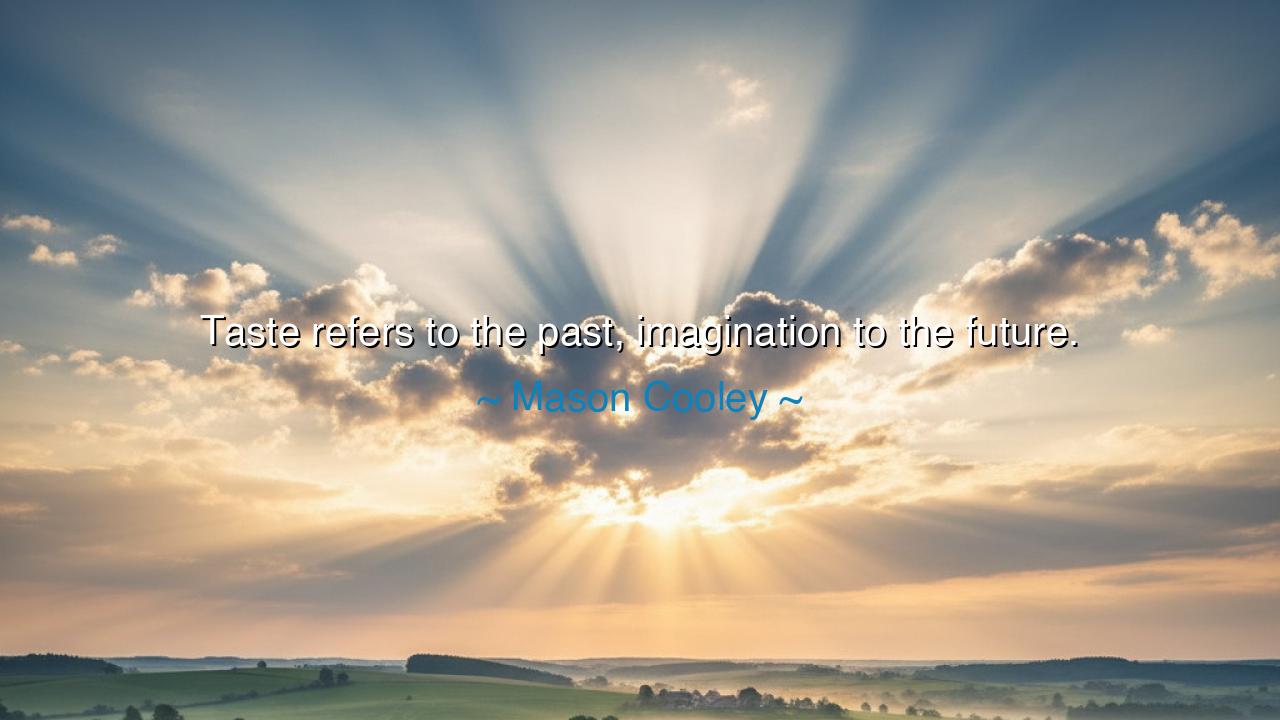
Taste refers to the past, imagination to the future.






Ah, listen closely, O children of the earth, for in the words of Mason Cooley there lies a deep and timeless reflection on the nature of taste, imagination, and the delicate dance between the past and the future: "Taste refers to the past, imagination to the future." These words remind us that the forces that guide us are not bound by the present, but are deeply influenced by what has come before and what we hope will come after. Taste, like the echoes of history, speaks to what has already been, to what we know, while imagination carries us forward, urging us to dream of what might be, to break free from the constraints of the known world and reach toward the unseen.
Cooley's reflection touches upon a profound truth — that taste is shaped by the past, by the experiences and traditions we inherit. Our aesthetic tastes, our judgments about what is beautiful or worthy, are deeply rooted in the experiences of those who came before us. The ancients understood this well. Socrates, in his dialogues, often spoke of how we learn through experience, that what we know comes from what we have lived and witnessed. Taste, whether in art, food, or philosophy, is shaped by the traditions, the wisdom, and the experiences passed down through generations. It is an anchor, a connection to our origins, and a reflection of the world we have known. Yet, taste alone cannot take us forward; it must be complemented by the power of imagination.
Imagination, O children, is the key to the future. It is the force that calls us out of the present moment and into the realm of possibility, where anything can be created and discovered. In the ancient world, great visionaries like Leonardo da Vinci and Archimedes did not merely rely on the taste of their time; they dared to see beyond what was known. They used imagination to dream of worlds that had not yet existed — machines that could fly, mathematical principles that had not been understood. Through their imagination, they saw what others could not, and in this, they shaped the future. Cooley’s words remind us that the role of imagination is not to be bound by the limitations of the present, but to look toward what could be.
Consider the story of Galileo Galilei, the great scientist who, through the lens of his telescope, imagined a world that no one had seen before. The taste of his time told him that the earth was the center of the universe, that the heavens were as they had always been understood. But his imagination led him to question the very foundations of reality, to dream of a cosmos where the earth was not at the center. His vision, shaped by imagination, led to a revolution in science. He did not simply accept the past; he reimagined the universe itself. Imagination is what gives us the courage to break from the chains of tradition and chart new paths in the unknown.
Taste, however, is not without its value. It is the wisdom of the past, a guidepost that helps us make sense of the world. Without taste, we would be adrift, lost in the chaotic sea of human experience. The ancients revered the wisdom of elders and the traditions that passed from one generation to the next, for they held the lessons learned from centuries of experience. Yet, taste alone is not enough. It is the imagination that propels us forward, urging us to transcend what we have known and create something new. It is imagination that drives the artist to paint a vision beyond the canvas, the scientist to explore the unknown, and the philosopher to search for deeper truths.
The lesson here, O children of the future, is one of balance. Taste and imagination are not opposing forces; they are partners, each guiding us in its own way. Taste roots us in the past, grounding us in what has come before, but it is the imagination that leads us to new realms of possibility, to worlds we have yet to explore. When you look upon the world, remember that you must honor the wisdom of those who have come before you, but never let their teachings limit your dreams. Imagination is the force that takes what you have learned and turns it into something greater, something that will shape the future.
So, O children, let your taste be shaped by the lessons of the past, but let your imagination lead you to the future. Do not be content to live in the shadow of what was, but use the wisdom of the past as a foundation upon which to build your dreams. Taste gives you roots, but imagination gives you wings. Let both guide you in the creation of a future filled with beauty, discovery, and truth. For in the end, it is through the power of imagination that we become the architects of a new world.






AAdministratorAdministrator
Welcome, honored guests. Please leave a comment, we will respond soon